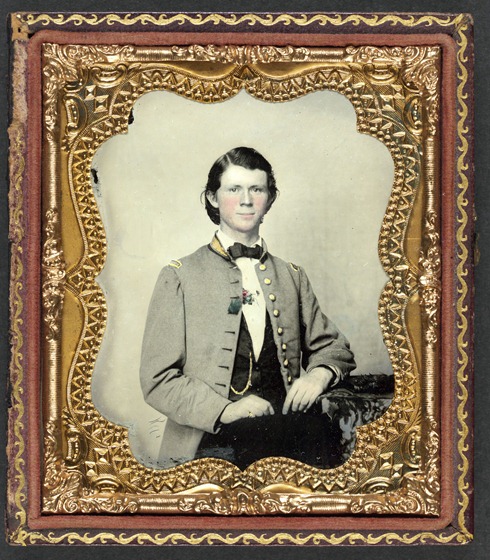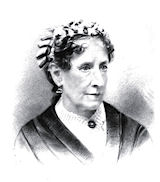Thursday, 29th.—Some cannonading down the river this morning; reported that Federals have passed through their canal.
Tuesday, January 29, 2013
Sunday, [March 29]. — Last night Lieutenant Austin came into camp with thirty-three men and two guns; a ten-pound Parrott and a three-inch Rebel gun captured by Colonel Crook at Lewisburg last summer. Cleared off cold last night; a strong northwest wind all night and today; bitterly cold. No fun in tent life in such weather. Rumors of the fight at Hurricane Bridge represent the Rebels as Jenkins’ men, four hundred to seven hundred strong.
Inscription behind photo: Prizeth with my most highly Treasured. Given to me by my Darling Beo [i.e. Beau] Bobbie. Died Oct. 5th 1862. Sept. 28th ’63. (Signed with illegible initials.)
Possible identification is Robert T. Willis of Company I, 32nd Virginia Infantry Regiment, based on research by Nancy Dearing Rossbacher.
Medium: 1 photograph : sixth-plate ambrotype, hand-colored ; 9.4 x 8.3 cm (case)
Donated by Tom Liljenquist; 2012
Liljenquist Family Collection of Civil War Photographs; Ambrotype/Tintype photograph filing series; Library of Congress Prints and Photographs Division.
Record page for image is here.
______________
Note: This image has been digitally enhanced for fade correction, color enhancement and selected spot removal.
Civil War Portrait 022
January 29 — Stopped snowing last night, but this morning the snow was seven inches deep. We moved back to camp at New Market.
New-York, Jan. 29th, 1863.
My own dear Son:
I enclose a copy of a letter received by your Uncle Phelps from Col. Allen. Mr. Phelps has been so good, so kind, so faithful to you and your interests, I can scarcely feel grateful enough. Now, he wishes me to lay before you the following facts for your consideration, and as a guide for your decision. Col. Allen says he has recruited about three hundred men, but owing to desertions he has only one hundred and fifty in camp, with the promise of two hundred more recruited by someone else, whom he may or may not receive. After receiving this letter Mr. Phelps went to Ex-Gov. Morgan; who is in the city, and requested him to write and ask Gov. Seymour to grant a furlough. Gov. M. said it would be of no use, as Gov. S. had no power; it was for him to give Commissions, and the War Department to make transfers. He (Gov. M.), however instructed his Secretary to write Col. Farnsworth requesting him to make an application, or assist you all in his power to get a furlough. The Gov. didn’t know as the Regt. could be raised, and if it were, Gov. S. might perhaps appoint another Col., and he was so desponding that Mr. Phelps, who had felt elated at your prospects, was so disappointed that he said to me, “I could have cried.” Then, Mr. Phelps met Mr. S. B. Chittenden, who said to him, “From all I hear of the talents of this young man, I think in the reorganization of the Army he will be promoted, which will be better than being troubled with this new Regt.” So you perceive, Mr. Phelps, having your interests so near his heart, scarcely knows how to advise, except to get a furlough if possible, come on, judge for yourself, and make your own decision. Col. Allen says, every day almost, ten or fifteen apply at his office, but, finding they are not authorized to give bounties, refuse to enlist. There is a bill now before the U. S. Senate for the encouragement of enlistments, offering bounties. I have told all these facts, and now leave the matter to your consideration. If you wish the Lt.-Colonelcy, I suppose you can have it at any time. Your own military experience makes you the most competent judge. Col. Allen wants you, and he thinks if bounties are offered, the Regt. will be full in four weeks. I cannot advise, but I pray God to guide you aright. God bless you my own dear son. Always,
Very Lovingly, Mother.
There are others pressing for the Lt.-Colonelcy, so as soon as you decide you had better write to your Uncle Phelps. Mayor Opdyke has a friend, somebody else, one of the Military Committee, also has a friend, but Col. Allen prefers you if you choose to accept.
29th. Thursday. Went to Minnie’s at nine. Found E. and M. about to go to the skating pond. Went as far as shop. No ice. Went down by the mill with E. Ice good. Called at Chester’s, Bigelow’s, Ella Clark’s and French’s, Mrs. Kenaston’s and Johnson’s. In the evening saw Fannie. Went down to F. Henderson’s. Bid F. goodbye at 9:30 P. M. Hard. Found Theodore at Prof. Ellis’s. Heard them sing awhile, then home. Bed at twelve.
Thursday Jan’y 29th 1863
It has been a wintery day, the snow still lying on the ground but it has frozen very little. The streets are deep with “slush.” The City is very quiet. All are in anxious expectation of hearing important news from some quarter, either from Rosecrans in Tennessee, or from Grant at Vicksburgh. From Hunter in S.C. or from Genl Foster in N.C. The “Army of the Potomac” is near by and will move when it can get out of the Mud. A little excitement in the Senate for the past day or two. A motion to expel Senator Saulsbury of Delaware for disorderly conduct on the floor was postponed today upon his making an apology. The Bill in the House to authorize the raising of Negro Regiments for the War creates much excitement there and the House did not adjourn yesterday, but sat all night and adjourned this morning without coming to a vote upon the question. I have not been out of my room since dinner. The side walks are too wet for walking. Doct Barnes called upon me today on his return from Rochester. I paid him $15.00 which I owed him. He is on his way back to his Regt. Business in the office has not been very brisk today, and the “Examining Board” have not had much to do. I have been reading and writing most of the day. Wrote “The Last Salute” for one thing and another article for a newspaper in reference to Hospital Funds. Pay Master Austin returned from the Army today, left there this morning.
Thursday, 29th—We have plenty of wood now. At about 2 o’clock this afternoon a brisk fire opened between our men and the rebels. We have not yet heard what was the cause of it.1 A scouting party seventeen miles out from the city had a skirmish with the rebel cavalry, but there were no losses outside of several horses. A report came into camp that Port Hudson has been taken by our forces.
1 This was down at Vicksburg, where there was some heavy cannonading between our gunboats and the Confederate batteries.—A. O. D.
June 29th. From twelve midnight to four o’clock this morning the mortars and batteries of the army firing from the rear into the rebel batteries, the enemy not taking any notice whatever. This morning, Lieut. J. H. Higbee, U. S. M. C., with a corporal, went over to the army in charge of the three prisoners of the 75th regiment of N. Y. V. At nine o’clock, inspected crew at quarters. The bombardment of Port Hudson, or Gibraltar No. 2 on the Mississippi, still going on, and continued through the remainder of this day.
JANUARY 29TH.—It appears from the Northern press that the enemy did make three attempts last week to cross the Rappahannock; but as they advanced toward the stream, the elements successfully opposed them. It rained, it snowed, and it froze. The gun carriages and wagons sank up to the hubs, the horses to their bodies, and the men to their knees; and so all stuck fast in the mud.
I saw an officer to-day from the army in North Carolina. He says the prospect for a battle is good, as soon as the roads admit of marching.
We have nothing further from the bombardment near Savannah. The wires may not be working—or the fort may be taken.
Gov. Vance has sent to the department a strong protest against the appointment of Col. August as commandant of conscripts in Northern Tennessee. Col. A. is a Virginian—that is the only reason. Well, Gen. Rains, who commands all the conscripts in the Confederate States, is a North Carolinian. But the War Department has erred in putting so many strangers in command of localities, where natives might have been selected. Richmond, for instance, has never yet been in the command of a Southern general.
There are indications of a speedy peace, although we are environed by sea and by land as menacingly as ever. The Tribune (New York) has an article which betrays much desperation. It says the only way for the United States Government to raise $300,000,000, indispensably necessary for a further prosecution of the war, is to guarantee (to the capitalists) that it will be the last call for a loan, and that subjugation will be accomplished in ninety days, or never. It says the war must then be urged on [click to continue…]











